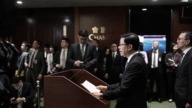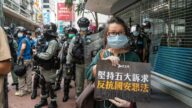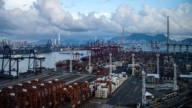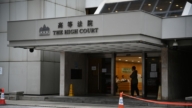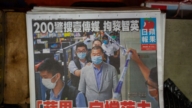【新唐人2014年06月26日訊】連日來,香港民眾為爭取民主發起的「6.22全民公投」運動,受到了海內外媒體的高度關注,尤其當公投的網上投票系統遭到了堪稱「國際互聯網史上第二大規模」的黑客攻擊後,更是引發了輿論對幕後操縱者的種種猜測。香港互聯網安全問題專家根據數據分析,公投網站所遭受的黑客攻擊,有四成來自中資機構。公投組織者認為,黑客攻擊的幕後黑手就是中共當局。
據香港媒體消息,截至6月24號下午7點,香港「和平佔中」全民投票總人數已經超過73萬5000人。儘管投票網站受到了大規模的黑客攻擊,公投的電子投票數量仍然達到了近70萬。
據報導,「和平佔中」全民公投的電子平臺,自6月20號接受電子投票開始,就持續受到「國家級」黑客瘋狂的網絡攻擊。
為了力保投票系統能夠正常運轉,公投聘用了擁有超過150萬客戶的美國網絡性能評估和安全服務公司「Cloud Flare」(雲火炬)迎戰黑客,這家公司總裁(Matthew Prince)在接受美國《華爾街日報》採訪時形容,黑客無所有不用其極,手法極為成熟。他說:「他們幾乎用盡書本上任何一種招數。有些招數,前所未見。」
「佔中」運動發起人之一的「香港大學」法律學者戴耀廷表示,黑客採取的「分散式阻斷服務攻擊」(DDoS攻擊),達到了至少每秒300GB的流量,而互聯網自有記錄以來,全世界最大規模的DDoS攻擊是每秒400GB。可見,這次針對投票系統的攻擊已經極為接近世界黑客攻擊最高記錄。
然而,這並不是黑客第一次對「佔中」網站進行攻擊。在此之前的6月13號,「佔中」電子投票系統曾經向香港市民開放,進行預先登記模擬,僅24小時之內登記者就超過萬人,但系統第二天就遭到了黑客強烈的DDoS攻擊,導致公眾無法登入。
網民大罵攻擊者卑鄙的同時,黑客還對所有「.hk」的域名伺服器進行了攻擊,這令全香港網絡流量從20號下午開始,變得異常緩慢,「香港大學民研投票系統」和很多帶有.hk域名的網站都無法登入。這種攻擊的規模,不只在香港歷史上少見,更是全球罕見。
那麼,究竟這些黑客來自甚麼地方?它們背後的操作者是誰?目地又是為了甚麼?
公投的網絡保安顧問、香港互聯網協會網絡保安及私隱小組召集人楊和生,23號公開指出,經初步分析,公投系統在6月13號到14號預先登記階段所受到的猛烈攻勢,有大約三到四成的網際網路IP(地址),來自與中資機構有關的網絡服務供應商。
加拿大全球信息自由網創辦人張新宇:「共產黨裡面也有一些比較有眼光的人,實際上從上個世紀,90年代就開始弄網絡攻擊、黑客、病毒這些東西。因為我當時也教過在廣州有一個自動化指揮師裡面軍人的電腦,當時他們請我去,我就了解了這些事兒。」
公投組織者對《法新社》表示:「我們有合理的理由認為,北京是幕後黑手,甚麼樣的部門能夠擁有這樣的資源和動機?……這次襲擊的規模在香港是史無前例的。」
張新宇:「因為中共它自己也知道自己政權的本性是一個獨裁政權,一講起『民』這個字,它就很敏感,因為它是反民主的嘛! 因為它知道香港搞民意這樣的活動一定會影響到中國大陸,那麼它必然會採取一切手段的。其中一切手段裡面就包括黑客攻擊。它自己認為這是它經過很長時間,20年的打造,打造出這麼一個所謂保護它自己的武器。」
旅居加拿大溫哥華的「全球信息自由網」創辦人張新宇表示,互聯網的自然屬性就是要「開放互聯」,而中共逆自然規律而行,利用黑客頻繁發動網絡攻擊,試圖改變民意,這樣作的結果,也只會適得其反。
採訪編輯/張天宇 後製/李勇
Beijing Behind Cyber Attacks on Hong Kong Poll?
June 22, Hong Kong movement for democracy’s referendum,
faced the second largest cyber attack in history.
While the public suspect the ‘herder’ behind the attack,
Hong Kong Internet security experts analyzed,
40% of the attacks came from Chinese-funded institutions.
Referendum organizers believe that the Communist regime
was directing the attack.
By 19:00 hours June 24, more than 735,000 people participated
in the Occupy Central referendum, reported Hong Kong media.
Nearly 700,000 electronic votes were registered,
in spite of massive cyber attacks on June 20th
CloudFlare, the web performance and security service
for more than 1.5 million websites, was tasked to protect
the online polling system.
Matthew Prince, CEO of CloudFlare, told Wall Street
Journal, the online assault was ‘one of the largest and most
sophisticated’ attacks in Internet history.
Benny Tai, an organizer of Occupy Central, indicated
the hackers used a distributed denial-of-service attack
(DDoS), which generated 300 gigabytes (GB)
per second of traffic, only second to the largest attack
in history at 400 GB per second.
Occupy Central had experienced a cyber attack
on June 13 when pre-registration was initiated.
In 24 hours, more than 10,000 Hong Kongers logged on.
However, the system went down the next day
due to a severe DDoS attack.
Meanwhile, all domain names ‘.hk’ were also under attack.
Internet traffic was seriously jammed from the afternoon
of June 20.
Including the referendum website Popvote.hk, many websites
containing .hk domain were down.
The scale of the attack was rare in Hong Kong and the world.
Where did these hackers come from?
Who is the operator behind them?
What is the purpose of the attack?
Sang Young, referendum cyber security consultant, announced
on June 23 that preliminary analysis of attacks
in the pre-registration on June 13 and 14 showed 40% of IP
addresses were associated with Chinese-funded institutions,
reported Voice of America.
Zhang Xinyu, founder of Global Information Freedom
Movement website:"There are some people in the Communist Party
who had the foresight.
In fact, since the 1990s, they have engaged
in using cyber attacks, hackers and viruses.
I was teaching computing to the automation command
division of the military in Guangzhou.
I learned the fact at that time."
According to AFP, the referendum organizer believed
the large-scale attack could only have been carried out
by Beijing, based on resources, motivation and severity.
Zhang Xinyu: “The Communist regime is aware of its own
dictatorship.
Democracy is a sensitive term to the regime.
The democratic activity in Hong Kong will surely affect China.
It will use all means, including hacking, which took 20 years
to build, to protect its power."
Zhang Xinyu indicates the nature of the Internet is to allow
people to connect freely.
The Communist regime is fighting against the law of nature
by launching cyber attacks.
The CCP’s intention to change public opinion
will only be counterproductive.
Interview & Edit/Zhang Tianyu Post-Production/LiYong


